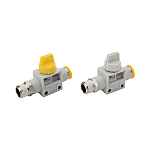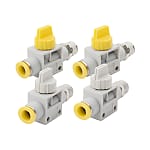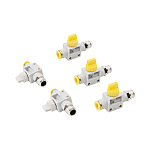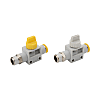(!)NOTE : Windows 7 users won’t be able to use some latest features of eCatalog/WOS since Microsoft is ending support for Windows 7 on 14 Jan, 2020. Please upgrade your system for uninterrupted services.
- Notice of End of Sales for Economy Series Pneumatic Equipment Category. More information.
MISUMI Hand Valves(Plumbing Thread Nominal:1/4)
Brand |
|
|---|---|
| CAD |
|
| Days to Ship |
|
1 items
- Sort By
-
Recommended
You can add up to 6 items per a category to the compare list.



 MiSUMi Economy
MiSUMi EconomyHand Valves One-Touch Fitting/Male Thread【1-20 Pieces Per Package】
MiSUMi EconomyMISUMI
- Economy series Hand Valves, One-Touch Fitting, Male Thread.
- Material Body: PBT (Polybutylene terephthalate).
- Material Threaded Part: Brass.
- Surface Treatment Threaded Part: Nickel Plating
- Color Knob: Three-Way Valve (Yellow Knob) and Two-Way Valve (Gray Knob).
- Applicable to air tube outer diameter size: 4, 6, 8, 10 and 12 mm.
- Number of Ports: 2
- Maximum operating pressure: 1.0MPa
- Operating Temperature Range: 0 to 60℃
- Flow Direction: Tube → Threaded Part and Threaded Part → Tube.- Volume Discount
Connecting Tube Diameter Number of Ports Switching Operation Effective Sectional Area(mm2) Main Body Shape Pipe Port Type Number of Switching Positions Plumbing Thread Nominal Plumbing Type and Direction Effective Sectional Area【classification】(mm2) How to Mount Ø6 / Ø8 / Ø10 / Ø12 2-Port Selecting Knob - One-Touch Fitting Type One-Touch Plumbing - 1/4 Direct Side Surface - Side From: ₹ 226.25 Days to Ship: Same day  Same day
Same day
| Brand |
|---|
| Product Series |
| CAD |
| From |
| Days to Ship |
| Specifications |
| Connecting Tube Diameter |
| Number of Ports |
| Switching Operation |
| Effective Sectional Area(mm2) |
| Main Body Shape |
| Pipe Port Type |
| Number of Switching Positions |
| Plumbing Thread Nominal |
| Plumbing Type and Direction |
| Effective Sectional Area【classification】(mm2) |
| How to Mount |
You can add up to 6 items per a category to the compare list. | |
| Brand | MISUMI |
| Product Series | Hand Valves One-Touch Fitting/Male Thread【1-20 Pieces Per Package】 |
| CAD |
|
| From | ₹ 393.00- |
| Days to Ship | Same day |
| Specifications | |
| Connecting Tube Diameter | Ø6 / Ø8 / Ø10 / Ø12 |
| Number of Ports | 2-Port |
| Switching Operation | Selecting Knob |
| Effective Sectional Area(mm2) | - |
| Main Body Shape | One-Touch Fitting Type |
| Pipe Port Type | One-Touch Plumbing |
| Number of Switching Positions | - |
| Plumbing Thread Nominal | 1/4 |
| Plumbing Type and Direction | Direct Side Surface |
| Effective Sectional Area【classification】(mm2) | - |
| How to Mount | Side |
Loading...
Configure
Specification/Dimensions
-
Connecting Tube Diameter
- Ø4
- Ø6
- Ø8
- Ø10
- Ø12
- 1/4
- 5/16
- 3/8
- 1/2
-
Number of Ports
- 2-Port
- 3-Port
-
Switching Operation
- Manual Lever
- Knob
- Selecting Knob
-
Effective Sectional Area(mm2)
-
Main Body Shape
- One-Touch Fitting Type
- Others
-
Pipe Port Type
- Rc (R)
- One-Touch Plumbing
- Others
-
Number of Switching Positions
- 2-Position Normally Open
- 2-Position Normally Closed
- 2-Position Exhaust
- 2-Position Direction Switching
-
Plumbing Thread Nominal
- M5
- 1/8
- 1/4
- 3/8
- 1/2
-
Plumbing Type and Direction
- Direct Side Surface
- Others
-
Effective Sectional Area【classification】(mm2)
-
How to Mount
Narrow search by specifying Manufacturer
Related Categories to Hand Valves
FAQ Hand Valves
- Question: What is a hand valve and its functions?
- Answer: A hand valve is a manually operated device used to control the flow of fluid (liquids or gases) in a system. It consists of a handle or lever that, when turned, adjusts the position of an internal mechanism to either open or close the valve. Hand valves serve to regulate fluid flow, isolate sections of a pipeline for maintenance, and control pressure. They find application in various industries such as plumbing and industrial processes.
- Question: When should you use the hand valve?
- Answer: Use a hand valve when manual control of fluid flow is necessary. It's employed to start, stop, or adjust flow rates in systems requiring human intervention, such as emergencies, maintenance, or precise adjustments. Hand valves are useful when automation isn't feasible, during equipment servicing, or when immediate response to changes is needed. They offer a simple and reliable means of flow regulation in various industries.
- Question: What are the advantages and disadvatages of hand valves / manual valves?
- Answer: Advantages of hand valves (manual valves) include simplicity, reliability, and cost-effectiveness. They offer precise control and immediate response during emergencies or maintenance, making them suitable for small-scale applications. However, they can be slower to operate compared to automated valves, require physical presence for adjustments, and might not be suitable for large-scale or continuous processes. Additionally, potential human error in operation and limited remote control are notable disadvantages.
- Question: What are the different types of hand valves?
- Answer: Ball valves: Easy to operate and offer a good seal.
Butterfly valves: Offer good flow control and are relatively inexpensive.
Gate valves: Provide a positive shutoff but can cause some pressure drop.
Globe valves: Good for throttling flow and can handle particulates.
Needle valves: Offer precise flow control.
Plug valves: Simple and reliable for on/off applications. - Question: Can ball valves be partially open?
- Answer: Technically yes, but it's not recommended for standard ball valves. Partially opening a ball valve can cause wear and tear on the seats, reducing their effectiveness over time. However, there are special ball valve designs, like V-port valves, that are specifically designed for throttling applications.
- Question: What are the common materials used for valves?
- Answer: Hand valves are commonly constructed from materials such as brass, stainless steel, cast iron, bronze, and plastic (such as PVC or CPVC). The choice of material depends on factors like the type of fluid being handled, pressure requirements, temperature conditions, and corrosion resistance. These materials ensure durability and compatibility with various applications across industries like plumbing, industrial processes, and water treatment.







How can we improve?
How can we improve?
Thank you for your time.
Your feedback is essential for our continuous improvement
Privacy Policy
Thank you for your cooperation.
Thank you for your time.
Your feedback is essential for our continuous improvement
Please use the inquiry form.
Privacy Policy